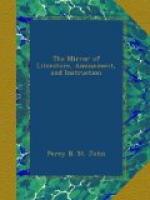“Shee feared God, and knew how to serve him; Shee assigned times for hir devotions and kept them; She was a perfect wife and a true friend, and shee joyed most to affect those nearest and dearest unto me; She was still the same: ever kind and never troublesome; oft preventing my desires, disputing none; providently managing all was mine; living in apparence above my state; yet advanced it; Shee was of a great spirit, sweetly tempered; of a sharp wit, without offence; of excellent speech, blest with silence; of a cheerfull temper modestly governed; of a brave fashion to win respect to daunt boldness; pleasing to all of hir sex; entyre with few, delighting in the best; ever avoiding all places and persons in the honours blemished; and was as free from doing ill as giving the occasion: Shee dyed as she lived, well and blessed; in hir greatest extremity most patient, sending up hir pure soule with many zealous prayers and hymnes to hir maker; powring forth hir passionate heart with affectionate streams of love to hir”—
“Husband” should have followed, but tradition tells us that by this time his grief swelled to such a height that he could not proceed any further.
T. H.
* * * * *
At the recent sale of a provincial theatre and its appurtenances, one article was to be included in the purchase, of which a short lease is by no means desirable—a new drop.
* * * * *
BRITISH TARS,
Who are so fond of harmony among themselves, have a great dislike to concord as applied to their enemies, and find even a disagreeable association in the very sound of the word, as the following anecdote will exemplify:—Among the illuminations for the last peace, were some of a very grand description, and on the door of a foreign ambassador in London, the words “Peace and Concord” figured at full length in characters of flame. “What say you, Mounsier, Conquered!” exclaimed an honest sailor, to whom a stander-by was explaining the mystic words; “shiver my timbers, who ever dared to call us ‘Conquered’ yet?” and so saying, was proceeding to extinguish the unlucky blaze, when a civil explanation, to which British bravery is ever ready to yield, restored Peace, and allowed Concord to continue.
* * * * *
REMEDY FOR DULNESS.
Lord Dorset used to say of a very goodnatured, dull fellow, “’Tis a thousand pities that man is not illnatured! that one might kick him out of company.”
* * * * *
NATIONAL COMPLAINTS.
The Englishmen at Paris find fault with the French roast beef; the Frenchmen in London complain of the British brandy.
The English who visit Paris, imagine that the tavern-keepers have served in the cavalry, as they are so expert in making a charge.




